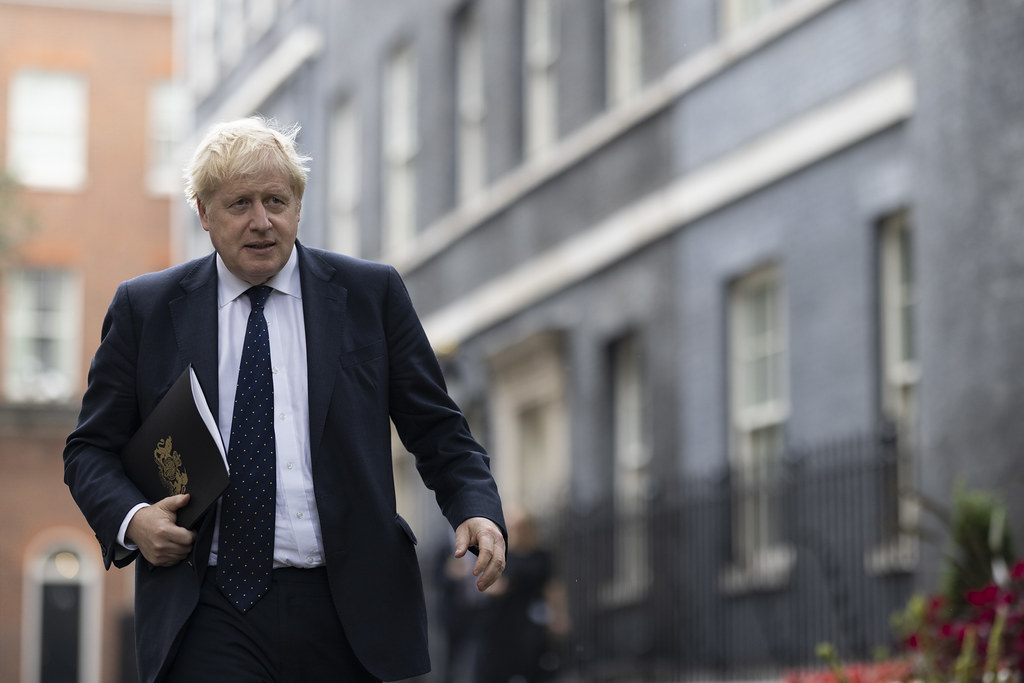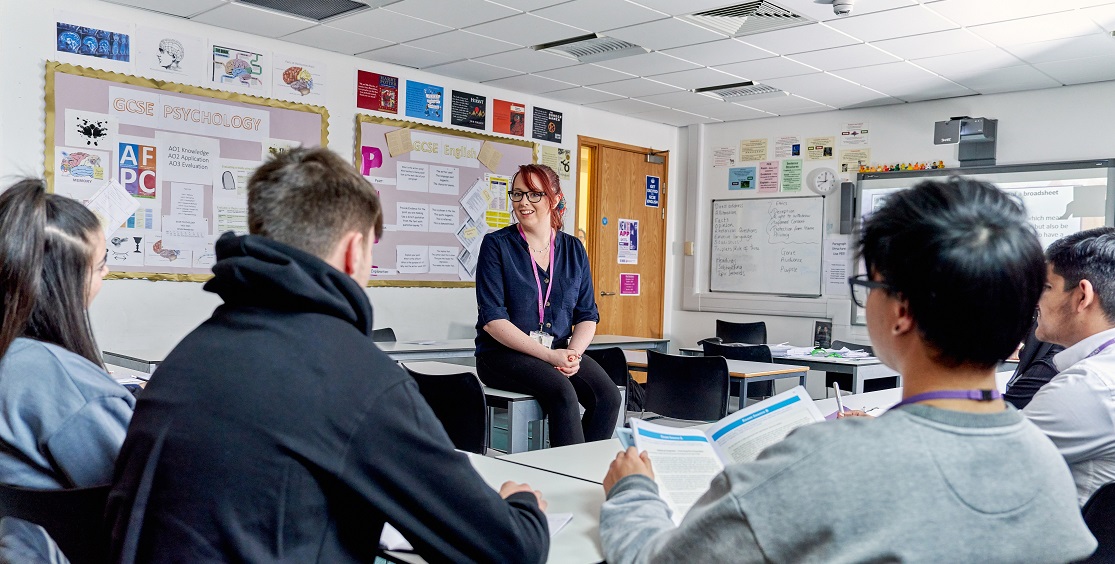Prime Minister announces £3,000 ‘levelling up premium’ to incentivise teachers into high-need areas

Iin his speech [Wednesday 6 October] at the Conservative Party Conference, the Prime Minister @BorisJohnson announced a £3,000 ‘levelling up premium’ to entice maths, physics, chemistry and computing teachers to take jobs in schools serving disadvantaged areas.
Paul Whiteman, general secretary of school leaders’ union NAHT, said:
“The Prime Minister is right to highlight the recruitment challenges that many schools are currently facing. However this solution is not ambitious enough, and we also know that similar schemes launched in the past have had very limited impact. The government must be prepared to wrestle with some of the more fundamental problems that are causing the current issues around recruitment and retention in teaching.
“The plans suggested here have not been developed with the benefit of consultation with the education profession. We would urge the Prime Minister to do more to engage with school leaders before making future policy announcements.
“The salaries of teachers and leaders have declined against inflation for the last decade, undermining their real value and making teaching uncompetitive in relation to other professional graduate occupations. The government needs a compelling proposition to encourage entrants to a decades-long professional career in teaching.”
Commenting as Education Secretary Nadhim Zahawi talks more (7 Oct) about the ‘levelling up premium’ for maths and science teachers announced by the Prime Minister yesterday, Paul Whiteman, general secretary of school leaders’ union NAHT, said:
“We’re pleased to hear that the new Education Secretary is taking a pragmatic look at the issues around recruitment and retention of teachers and school leaders.
“We would agree that the best thing to do is to listen to the pay review body for teaching. The salaries of teachers and leaders have declined against inflation for the last decade, undermining their real value and making teaching uncompetitive in relation to other professional graduate occupations.
“We would hope that the government will also be prepared to wrestle with some of the more fundamental problems that are causing teachers and leaders to leave the profession, like the damagingly high levels of accountability and unmanageable workload.”
Kevin Courtney, Joint General Secretary of the National Education Union, said:
“Boris Johnson is right to focus on society’s built-in inequality. But given this stated aim to ‘level up’, he has made a very poor start.
‘Cutting £20 from Universal Credit that will plunge millions of people into dire straits while ignoring his own education recovery tsar’s recommendation that schools and colleges need £15 billion catch up funding, is the opposite of ‘levelling up’. Increasing levels of child poverty will put paid to any talk of equality and ensuring children and young people achieve their full potential.
‘Introducing a £3,000 premium for maths and science teachers is welcome but ignores the fact that there are teacher shortages across the curriculum. Unreasonable and intensive workload, pay and lack of professional agency is driving teachers from the profession in ever increasing numbers. This must be addressed by the Government urgently.
‘Guts are not all that is needed to help our country recover from this pandemic. The profession and the families we serve need commitments that go beyond the rhetoric. We need properly funded policies to end child poverty and ensure that our schools and colleges are given the resources so that every child and young person succeeds regardless of their background or where they live.
‘The Prime Minister said in February that education recovery was a national priority. Eight months later, parents will think that it is about time that he puts the money where his mouth is. All eyes will now turn to the spending review later in the month to see if the Government has ‘the guts’ to invest in education recovery”.
Kate Green MP, Labour’s Shadow Education Secretary, responding to the Prime Minister announcing a recycled policy of a premium for maths and science teachers which the Government had only recently scrapped, said:
“The Conservatives have no idea how to improve education and outcomes for young people. The premium announced today is a less generous recycling of an old policy that Boris Johnson’s government scrapped just a year ago.
“Under the Conservatives teacher vacancies have more than doubled, school funding will be lower in real terms next year than it was in 2010 and the promised £30,000 teacher starting salary has still not been delivered.
“Labour has set out a clear plan to deliver an excellent education to all with over 6,500 new teachers and ongoing professional training to ensure every child is taught by a highly skilled expert teacher. Combined with professional careers advice and reintroducing compulsory work experience, and embedding digital skills across the curriculum, Labour would ensure every young person leaves school with the skills they need for life.”
Natalie Perera, CEO of the Education Policy Institute (EPI), said:
“One of the greatest challenges in education is ensuring that highly qualified teachers are available to schools situated in the most deprived parts of the country. Our research has uncovered severe shortages of teachers in subjects such as maths and physics, especially in disadvantaged areas of the country, where they are far less likely to have a degree in the subject they teach.
“The government’s move to reinstate targeted payments that aim to get teachers into challenging areas is therefore a welcome move – albeit one that has come late in the day.
“The government adopted our recommendations in 2019 when it originally introduced the policy, only to scrap it in 2020 – a decision which was very short-sighted given the precarious position of the teacher labour market at the time.
“While the Prime Minister’s announcement is encouraging, we await further details on how the policy will be targeted, as this will be crucial to its success.”
Salary boosts for new maths, physics, chemistry and computing teachers
Teachers in the early years of their careers will be able to get a salary boost of up to £3,000 tax-free to teach maths, physics, chemistry and computing.
This will support recruitment and retention of specialist teachers in these subjects and in the schools and areas that need them most.
Prime Minister Boris Johnson announced the package. It will be available to eligible teachers in the first five years of their careers, and is backed by a commitment of £60 million in funding.
International evidence indicates premiums that deliver a 10 per cent increase in pay could reduce leavers from among early career teachers in shortage subjects by 30 per cent.
Targeted pay incentives for teachers were introduced by the government in 2019 based on EPI recommendations – but were subsequently abandoned in 2020.
EPI called for such targeted payments for teachers to be reinstated in our recent May 2021 report, “Local pay and teacher retention in England“.
Read the original EPI analysis of the 2019 salary supplement scheme below:
Teaching profession is facing acute recruitment and retention challenges

2nd Mar 2021: EPI has published a new report “Teacher shortages in England: analysis and pay options” examining how teacher shortages and pay levels vary between schools in England.
The new research considers schools and subjects with the greatest teacher shortfalls, and whether schools with workforce pressures have been able to provide incentives to attract new teachers. The study also scrutinises the government’s proposals to boost teacher salaries by 2022.
Key findings
The teaching profession is facing acute recruitment and retention challenges
- The teacher labour market in England faces huge challenges:while pupil numbers in secondary schools in 2019 were the same as in 2007, teacher numbers fell by 7%.
- A pupil population bulge is now hitting secondary schools: pupil numbers are expected to rise by as much as 10% between 2019 and 2023.
- Teachers are much more likely to exit during their first few years of teaching–1 in 5 new teachers leave the profession after their first two years, while 4 in 10 leave after five years. These high exit rates are increasing for each successive teaching cohort.
- Teacher exit rates are far more severe in shortage subjects such as maths, sciences and languages, where as many as half of all teachers leave the profession after five years.
- A growing proportion of exits from the profession are due to career moves to other non-teaching jobs.Teachers are currently paid less than most other professional occupations, and pay is even more uncompetitive for those with degrees in maths and physics.
These challenges are even greater for schools in disadvantaged areas
- Disadvantaged schools also report greater difficulties in filling teaching posts. 22% of schools in the most affluent areas report vacancies or temporarily filled positions – but this increases to around 29% of schools in the most disadvantaged areas outside London and 46% in the most disadvantaged areas inside London.
- Teachers in disadvantaged schools outside London are also more likely to be off sick than those in more affluent schools, taking 50% more sick leave on average each year. Across an average secondary school,this equates to about an extra 100 days lost to sickness a year.
- Problems are particularly pronounced in subjects such as maths, sciences and languages, where many schools struggle to recruit teachers with a degree relevant to the subject they are teaching.
- Higher pay for graduates in roles outside of teaching is likely to be driving teacher shortages in maths and science subjects.
- Except for in London, disadvantaged schools are failing to use funding streams such as the Pupil Premium and other pay freedoms to secure highly qualified teachers.
- Average teacher pay in shortage subjects in disadvantaged schools is around £1,500 lower than in the most affluent schools. This is entirely explained by the fact that disadvantaged schools employ a much larger share of less experienced teachers.
- The picture is different in London, where disadvantaged schools are on average paying an extra £1,500 per year to teachers in shortage subjects,even after accounting for teacher experience. London schools are much more successful in securing qualified teachers in these shortage subjects.
The government is starting to address these problems with higher starting salaries and pay incentives, but current plans do not go far enough
- The government has recently announced higher salaries of £30,000 for new teachers from September 2022.It has also announced retention incentives of £2,000 per year for new teachers in shortage subjects, plus an extra £1,000 per year in “challenging areas”. Both policies follow empirical evidence and are likely to improve teacher recruitment and retention.
- However, these measures do not go far enough: disadvantaged schools are much less likely to secure increases in school funding in 2020.This will make it harder to afford higher starting salaries in 2020 and more difficult for them to compete on teacher pay.
To address these issues, the government should:
- Ensure schools with large numbers of new teachers (including many disadvantaged schools) receive sufficient resources to pay for the new, higher, starting salaries. This could be achieved through changes to the national funding formula and ensuring that overall the distribution of additional funding for schools remains progressive.
- Extend retention incentives of £2,000 per year to existing early career teachers in shortage subjects.This will help keep existing early career teachers at risk of leaving, as well as new teachers.
- Double the extra payments for teaching in “challenging areas” to £2,000 per year, extend them to existing teachers and focus these on the most disadvantaged 20-25% of schools. This will create an additional incentive to teach at disadvantaged schools and be better targeted than the existing approach, which can exclude schools with high proportions of poorer pupils.
- Extending pay incentives to all early career teachers in shortage subjects and doubling the payments for teaching in disadvantaged schools would likely have a high impact, while being relatively inexpensive for government, costing less than £55m. This compares with a cost of about £20m for the government’s existing scheme.
A Department for Education spokesperson said:
“There are more than 453,000 full-time equivalent teachers – over 12,000 more than in 2010 – with increasing numbers also returning to the profession.
“We recognise that some schools and areas face greater challenges with recruitment and retention than others. To tackle this we are delivering a number of targeted programmes to support teachers to join and remain in the profession in those places.
“We have also set out proposals to raise starting salaries for new teachers to £30,000 and we are pleased the Education Policy Institute recognises this could put teaching among the best paid major professions and help boost retention.”
Tory govt must tackle teacher recruitment crisis, Liberal Democrat education spokesperson Layla Moran MP said:
“Children living in our most disadvantaged areas are losing out from the Conservatives’ failure to tackle the teacher recruitment crisis. In schools where more children are on free school meals, fewer teaching posts are filled, more experienced teachers are moving on and staff take more days off because of stress and workload.
“It’s time that the Government started valuing our teachers. The increase in starting salaries is welcome, but our experienced teachers also need a proper pay boost to keep them in the profession – and schools can’t be expected to pick up the tab.
“Liberal Democrats would guarantee teachers high-quality professional development and put an end to the constant political meddling in our curriculum, testing and inspections system. It has placed too high a burden on teachers’ workload and mental health.
“Children will lose out if the Conservatives don’t start treating teachers like the highly-valued professionals that they are.”
Dr Mary Bousted, Joint General Secretary of the National Education Union, said:
“As the EPI report itself notes, teacher recruitment and retention problems are widespread and severe. The proposals in the EPI report for yet further fragmentation of pay will cause more problems.
“Recruitment and retention problems affect the whole system, including schools of different types and locations. The dismantling of the national teacher pay structure has contributed to the teacher recruitment and retention crisis, because it has removed the clarity, fairness and transparency that is so important in attracting and retaining teachers. One of the key reasons we need a national pay structure for teachers is to enable mobility across the huge school system, including disadvantaged schools.
“’Targeted’ approaches to teacher pay have not solved the deepening recruitment and retention problems and have simply moved shortages around the system. They create dismay amongst teachers who do not benefit and further reduce pay fairness and transparency. Recruitment and retention problems may be more or less severe according to various measures, but the key point is that the problem is a system-wide one. That means we need whole system solutions including the restoration of the national pay structure, making good the pay teachers have lost against inflation and ensuring that teacher pay levels are competitive with those of other graduate professions.”











Responses